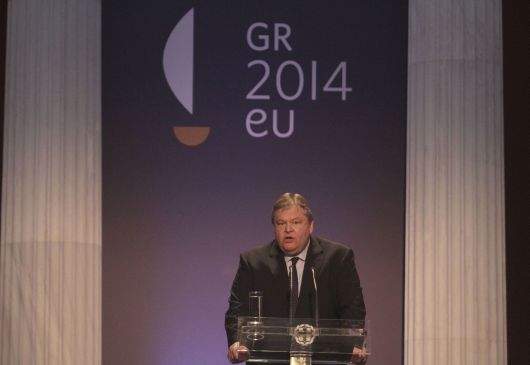 Today marks the end one of the more intensive semesters of the past 40 years.
Today marks the end one of the more intensive semesters of the past 40 years.
These 180 days coincided with:
1. The challenge of the Hellenic Presidency of the Council of the European Union.
2. The test of municipal, regional and European elections, from which the country emerged stable and with a clear strategic orientation that bore in mind the urgent needs, the endurance and the messages of Greek society.
3. Greece’s return to the international bond markets, which took place on very encouraging terms.
4. The official confirmation of the primary surplus that we achieved in 2013 and that enabled us to fund a first social dividend that went to the most vulnerable social groups.
5. The second phase of the recapitalization and reconstruction of the Greek banking system, with the significant participation of foreign private capital, so that now the banks are focused on their main mission: supporting businesses, jobs, households.
6. Major structural changes that are opening up the market, to the benefit of consumers, in combination with measures for protecting the weakest groups, such as the regulations for protection of primary residences.
The list of domestic developments is very long.
Equally long is the list of international crises during these six months, from Ukraine to Iraq, on which Greece, as a member state of the European Union and NATO, had to take stances based on principles, but always bearing in mind the protection of its national priorities.
It was on this landscape that Greece’s Presidency of the Council of the European Union unfolded; our fifth Presidency since our accession the European Communities.
Organizationally, we moved in complete coordination and flexibility, and with speed, effectiveness and economy, spending just 30% of the relevant budget – saving 70%. The Greek Presidency spent significantly less than all of the previous presidencies of small, medium-sized and large member states.
Politically, we moved with extremely clear priorities and goals, in close and institutionally dignified cooperation with the permanent presidencies of the European Council, the Eurogroup, and the Foreign Affairs Council; with the European Commission, with the Secretariat of the Council, and, of course, with the European Parliament, its President, the Plenary, the committees and the parliamentary groups.
The list of the Greek Presidency’s achievements in all the Council configurations is impressive. We completed legislative procedures that had been pending for years, and we made critical political decisions that will shape the new Commission’s priorities.
The congratulations and expressions of thanks that we have heard are not just the usual matter-of-form responses to every presidency that rotates through.
In turn, I would like to express my warm thanks to
• the Prime Minister for his constant – automatic, I would say – cooperation.
• all of the Cabinet Members who chaired individual Council configurations, under the coordination of the General Affairs Council.
• my closest collaborator on these issues, Deputy Foreign Minister Dimitris Kourkoulas.
• Deputy Foreign Minister Kyriakos Gerontopoulos, who took on the distant missions, the Secretaries General, and all of the Foreign Ministry personnel, among whom I make special reference to the Director General for European Affairs, Ambassador Alexandra Papadopoulou, the Permanent Representative to the European Union, Ambassador Theodoros Sotiropoulos, Deputy Permanent Representative Andreas Papastavrou, and the head of the Presidency Office, Ambassador Dimitris Karamitsos-Tziras.
I thank all of the personnel of Greece’s public administration, who did their very best for this Presidency.
This is not the time to go into a detailed review, but I must refer indicatively to the major steps taken towards completion of the Banking Union, the new comprehensive European Maritime Security Strategy, the political guidelines on immigration policy, the new Common Agricultural Policy.
And in the field of foreign policy and neighbourhood and enlargement policy:
The meetings in Thessaloniki, on the Western Balkans, and in Athens, with the member states of the Arab League.
Through specific moves that will be remembered by the other states, Greece politically upgraded its position in all the regions of special interest to it: the Western Balkans, the Mediterranean, the Black Sea, the Middle East, North Africa.
What’s more, the Hellenic Chairmanship of the Organization of the Black Sea Economic Cooperation (BSEC) is starting now, in the midst of international and regional upheaval that renders the economic challenges and opportunities even greater.
Greece is just a step away from a definitive exit from the crisis and a return to the normalcy and essential equality of a member state of the European Union and the Eurozone.
This normal and equal aspect of Greece – in contrast to the unjust, negative stereotypes that fuelled the crisis – was pointed up in the best possible manner by the Greek Presidency. Let us safeguard this attainment without political pettiness for domestic consumption. We owe it to the Greek people, for the tough sacrifices they have made.
July 1, 2014


